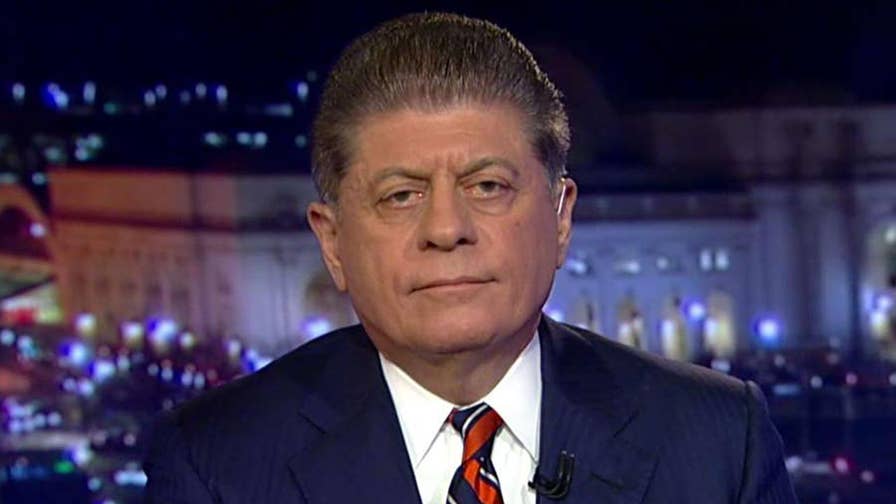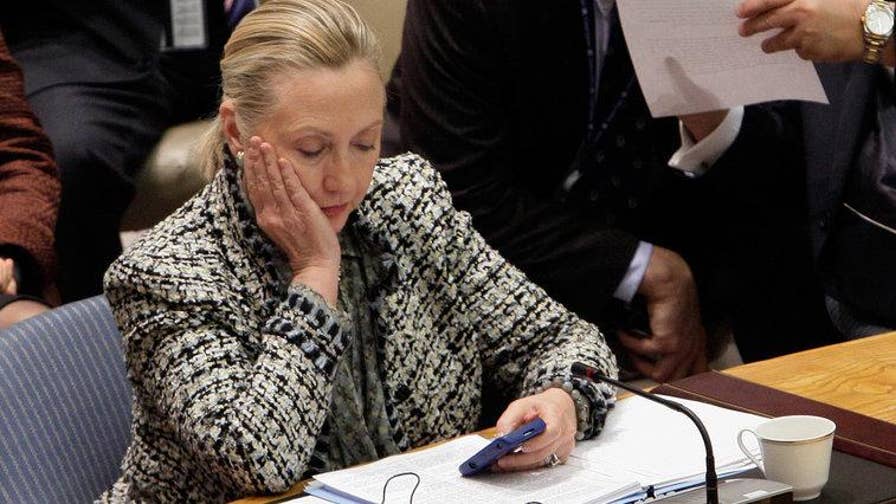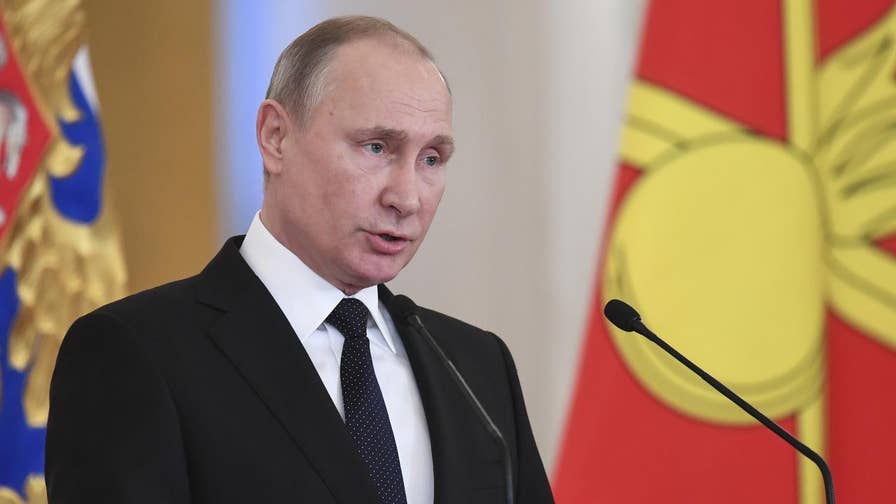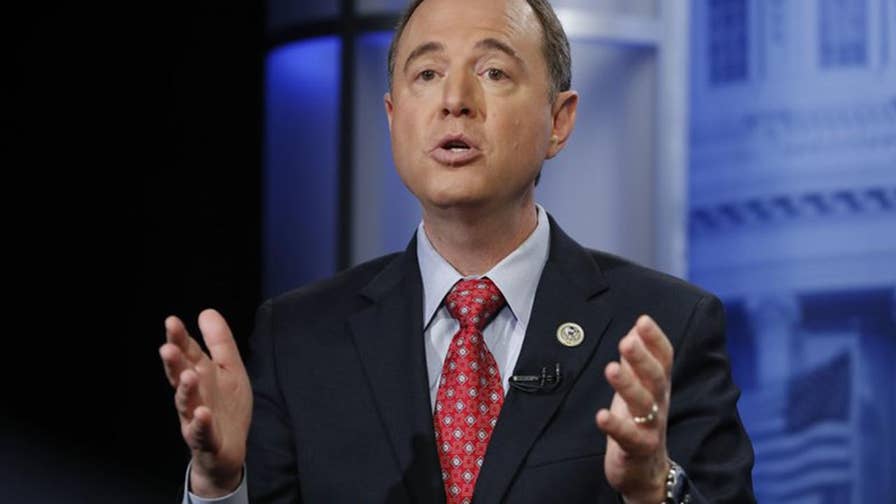Friday, January 19, 2018
Grade school's anti-border wall posters describe police as predators
At first glance, the posters displayed inside classrooms at El Camino del Rio/River Road Elementary School seemed innocuous.
"Immigrants Welcome," the posters read.
Click here for a free subscription to Todd's weekly newsletter - a must-read for Conservatives! But there was more. There was a drawing that included wire cutters and a barbed-wire fence. And there was more writing:
"The border is not a wall - it's a system of control. It doesn't protect people; it pits them against each other. It doesn't foster togetherness; it breeds resentment. It doesn't keep out predators; it gives them badges and guns," the posters read. "The border does not divide one world from another. There is only one world, and the border is tearing it apart."
Eugene, Ore. radio station KLCC reports there was also a website address on the posters -- directing readers to a pro-anarchist website called, "Crimethinc.com.
Crimethinc describes itself as a "rebel alliance" and an "international network of aspiring revolutionaries extending from Kansas to Kuala Lumpur."
The organization is a "secret society pledged to the propagation of crimethink."
So why would teachers at an elementary school expose children to a self-proclaimed "international network of aspiring revolutionaries?"
Continue reading at ToddStarnes.com.
Todd Starnes is host of Fox News & Commentary. His latest book is “The Deplorables’ Guide to Making America Great Again.” Follow him on Twitter @ToddStarnes and find him on Facebook.
Trump DOJ asks Supreme Court to overturn DACA ruling
The Department of Justice on Thursday formally asked the U.S. Supreme Court to overturn a lower court’s ruling to block, in part, the Trump administration’s decision to phase out the Deferred Action on Childhood Arrivals program.
The unusual step bypasses the U.S. 9th Circuit Court of Appeals, which would have been the normal move to overturn U.S. District Judge William Alsup’s ruling.
Last week, the San Francisco-based judge ordered the Trump administration to renew parts of DACA and start accepting renewal applications from those already part of the program while related lawsuits make their way through the legal system. However, Alsup did not demand that new applications be accepted.
On Tuesday, Attorney General Jeff Sessions said Alsup’s ruling “defies both law and common sense” and said the department’s Supreme Court request would happen by week's end.
DACA, which impacts roughly 700,000 people dubbed “Dreamers,” had been set to expire March 5 after Sessions announced in September the Trump administration was rescinding the Obama-era program.
House panel releases Glenn Simpson testimony transcript
The co-founder of the opposition research firm
Fusion GPS told the House Intelligence Committee this past November that
"people were arrested or died mysteriously" after the existence of the
now-infamous "Trump-Russia dossier" was made public.
However, Glenn Simpson did not say
whether those affected actually contributed information to the
unverified dossier, which was compiled by former British spy Christopher
Steele and which BuzzFeed published in January of last year.
"I do believe there was a bit of an old-fashioned
purge," Simpson told the committee, before adding, " to my knowledge, it
wasn't anyone that helped us. I think it was more likely people who
were taking the opportunity to settle scores or were falsely accused ...
and/or were sources of the U.S. Intelligence Community, not us."'SOMEBODY'S ALREADY BEEN KILLED' BECAUSE OF TRUMP DOSSIER, FUSION GPS REP REVEALED
In August, Simpson's attorney told the Senate Judiciary Committee that "somebody's already been killed" as a result of the dossier's publication, but did not identify who the person was.
The Committee voted unanimously Thursday to released the transcript of Simpson's six-hour Nov. 14 appearance before the committee, one of three congressional panels investigating Russian actions during the 2016 presidential election campaign.
CLICK TO READ THE FULL TRANSCRIPT
Simpson told the committee that he and Steele began shopping the dossier to media outlets in late October of 2016, after then-FBI Director James Comey announced that the Bureau was re-opening the investigation into Democratic presidential nominee Hillary Clinton's private email server. He said he was "angry" that Comey, in Simpson's view, had "violated the sort of one of the more sacrosanct policies, which is not announcing law enforcement activity in the closing days of an election."
"We decided that if James Comey wasn't going to tell people about this investigation ... we would only be fair if the world knew that both candidates were under FBI investigation," Simpson said.
However, Simpson denied that Fusion GPS leaked the dossier to BuzzFeed and told the committee he was "not happy" when it was published.
"I was very upset," he said. "I thought it was a very dangerous thing and that someone had violated my confidences."
In his testimony, Simpson described how Fusion GPS was retained by Perkins Coie, a law firm representing the Democratic National Committee and the Clinton campaign, in the summer of 2016. He said the committee was paid a "flat fee" of $50,000 per month, plus expenses to research Trump on the Democrats' behalf.
"I'd say, in general, we were the architects of the research and we made most of the decisions about what to look for and where to look," he said.
Simpson also detailed facts Fusion GPS claimed to have uncovered about the president while the firm was contracted by the conservative Washington Free Beacon to do research on then-candidate Trump and other GOP contenders for the White House.
CONSERVATIVE WEBSITE FUNDED INITIAL FUSION GPS TRUMP OPPOSITION EFFORT
"Various [Russian] criminals were buying [Trump] properties," said Simpson, identifying one by the underworld name Taiwanchik. "I think he was running a -- his associates were living in Trump Tower, ·and he was running a high-stakes gambling ring out of Trump Tower, while he himself was a fugitive for having rigged the skating competition at the [2002] Salt Lake Olympics and a bunch of other sporting events."
"When Mr. Trump went to the Miss Universe pageant [in Moscow] in 2013," Simpson added, "Taiwanchik was there in the VIP section with Mr. Trump and lots of other Kremlin biggies."
The dossier made headlines for its salacious claims about Trump's sexual proclivities, but Simpson denied that the firm had wanted to investigate Trump's sex life, saying he "just didn't think it was a useful subject to investigate."
However, he added that the existence of such claims "is a big deal for Chris Steele ... This is something he has dealt with his entire adult life.
"So I can't tell you he wasn't looking·for that, because it was probably something that was among the things that he would have asked someone to check," Simpson said.
The committee's top Democrat, California Rep. Adam Schiff, said in a statement that Simpson had made "serious allegations that the Trump Organization may have engaged in money laundering with Russian nationals ..."
"Mr. Simpson ... testified that if the Trump Organization did engage in money laundering with the Russians, it would be with the knowledge or approval of the Kremlin and constitute powerful leverage over the President of the United States," Schiff added.
At one point during the committee interview, Simpson was asked the central question at the heart of the congressional investigations and that of special counsel Robert Mueller -- whether the Trump campaign had coordinated with Russia to influence the outcome of the 2016 presidential election.
Simpson did not say yes or no, but said the patterns of behavior that emerged from the investigation raise questions.
"I think that the evidence that has developed over the last year, since President Trump took office, is that there is a well-established pattern of surreptitious contacts that occurred last year that supports the broad allegation of some sort of an undisclosed political or financial relationship between the Trump Organization and people in Russia," Simpson said.
In Chile, pope met by protests, threats, burned churches
SANTIAGO, Chile – As he does during every papal visit, Pope Francis produced plenty of surprises in Chile: He married a couple during a flight, stopped his motorcade to help a fallen police officer and wept with victims of sex abuse by priests.
But the pope also faced protests and a level of hostility unheard of in modern times for a papal visit. Anti-pope protests had to be broken up with tear gas, attackers burned at least 11 Roman Catholic Churches and pamphlets were found threatening Francis that the "next bomb would be in your cassock."
"This kind of violence during a papal visit is absolutely unprecedented. And Chile is historically a very solidly Catholic nation," said Andrew Chesnut, the Catholic Studies chair at Virginia Commonwealth University.
It remains to be seen whether the friction in Chile was a fluke or a harbinger of what to expect in future papal trips.
The neighboring country of Peru, where Francis went Thursday, isn't taking any chances. Authorities have banned demonstrations because they "impact the image of the country," police spokeswoman Veronica Marquez said.
Papal visits sometimes attract demonstrations. In 2010, thousands in London protested the visit of Pope Benedict XVI, condemning his stance on condoms, women's rights and homosexuality, among other things. But the ferocity and firebombing of churches in Chile went beyond anything in modern memory.
"These violent acts may be a first in the history of the 'traveling papacy,'" said Massimo Faggioli, a theology professor at Villanova University in Philadelphia. "It is striking also because Latin America is supposed to be friendly territory for Francis" — the first pope from the region.
Chile has changed radically, from its economy to politics, in less than a generation. Those changes, combined with a pedophile priest scandal and what many argue was a bungled response by the church, has accelerated a move away from Catholicism. Last year, 45 percent of Chileans identified as Catholic, a sharp drop in just a decade from the mid-60s, according to Latinobarometro's annual poll.
One of the pope's sharply contested decisions — to appoint a Chilean bishop with close ties to the country's most notorious pedophile priest — soured many on the visit before it even began.
A few days before Francis arrived, a group angry about the cost of the papal visit briefly occupied the Nunciature in Santiago where the pope would sleep.
The same day, several churches were burned. Over the next couple of days during the pope's visit, several more churches were torched, along with three helicopters.
It was unclear who was behind the arson attacks. Outside some of the churches, pamphlets were found supporting the cause of indigenous Mapuche. Pamphlets outside one threatened the pope.
The Mapuche, Chile's largest indigenous group, are fighting for a return of ancestral lands, recognition of their language and an end to discrimination.
Much of Francis' trip was dedicated to the conflict. During his homily Wednesday in the heart of Mapuche territory, he took both the Mapuche and Chilean officials to task, calling for a halt to violence and for government engagement that goes beyond just "elegant" agreements.
The burning of churches is a tactic frequently employed by radical Mapuche groups: Nearly two dozen have been firebombed the last two years. That 11 were then attacked in just a few days is a possible sign that these groups saw the visit as an opportunity to bring more attention to their cause.
"The burning of churches is an expression of the disgruntlement" that many Mapuche feel for the Catholic Church, said German Silva, a political analyst at the Universidad Mayor in Santiago.
During Chile's 1973-1990 dictatorship, several bishops spoke out in defense of human rights and worked closely with indigenous populations. Today's bishops are much less visible, arguably less hands-on with the poor and in general the church has nowhere near the same moral authority.
Other groups protested the pope himself. While Francis celebrated Mass on Tuesday at a large park in Santiago, riot police shot tear gas and arrested dozens of protesters as they tried to march on the service.
Protesters included members of the country's LGBT community, socialists and people angry at the church's reaction to the sex abuse scandal that many Chileans don't feel has been resolved.
"There will be no peace for an accomplice who helps and protects a rapist," read one sign.
"Burn, Daddy!" read another.
Hours before Francis left Chile, he made comments that all but overshadowed his entire visit, and certainly would have added to the protests if they had come sooner. When asked why he defended Bishop Juan Barros, the former protege of the pedophile priest, Francis said there was no proof Barros knew about the abuse and called those accusations against him slanderous.
"After saying those things, if he came back here his reception would be even worse," said Erivano Luna, a computer technician in Santiago.
China secretly bought North Korean coal as US watched from above: report
The Glory Hope 1 is shown in a
satellite picture, where it reportedly took on illicit North Korean
coal.
(U.S. photo submitted to the
United Nations)
At least six cargo ships linked to
China furtively violated U.N. sanctions by taking on North Korean coal
late last year, potentially providing a significant boost to the rogue
regime's coffers, the U.S. alleges.
The U.N. Security Council in August
hit North Korea with sanctions that were projected to cut nearly $1
billion from its annual exports revenue of roughly $3 billion, banning
exports of coal, iron ore, and other products.
The move, which China ultimately endorsed, came after
the isolated country fired two intercontinental ballistic missiles that
raised international tensions.But the six vessels, which the U.S. tracked by satellite and formally reported to the U.N. as sanctions violators in December, defied the sanctions by bringing North Korean coal to Vietnam, Russia, or other ships in mid-sea transfers, the Wall Street Journal reported, citing U.S. officials.
The paper found that the six ships are either managed or owned by Chinese companies or firms registered in Hong Kong. The U.S. also sought to have four other ships that have no apparent connections to China labeled as sanctions violators.
One of the Chinese-linked cargo ships, the Glory Hope 1, began violating the sanctions just days after they were passed in August, U.S. officials said, according to the Wall Street Journal.
The Chinese-owned ship flew a Panamanian flag and turned off its automatic identifying transmitter as it headed into a North Korean port on Aug. 7, the Journal reported.

The Glory Hope 1 loitered for an extended period at a Chinese port after arriving from North Korea, U.S. officials told the U.N.
U.S. officials suspect the unusual maneuver was a ruse to make it appear that the crew was taking on Chinese cargo, according to the Wall Street Journal.
All U.N. members would have to ban the Glory Hope 1 and the other five ships from their ports in order to formally designate them as sanctions violators.
China’s foreign ministry told the Journal that it fully complies with U.N. resolutions. Several of the ship-owners and managers linked to the ships have reportedly been questioned by Chinese authorities.
U.S. National security advisor H.R. McMaster last month threatened harsh consequences for ships that continue to defy the sanctions.
“A company whose ships would engage in that activity ought to be on notice that that might be the last delivery of anything they do for a long time, anywhere,” McMaster said.
Subscribe to:
Posts (Atom)
-
Tit for Tat ? ROCHESTER, N.Y. (AP) — A statue of abolitionist Frederick Douglass was ripped from its base in Rochester on the an...
-
NEW YORK (AP) — As New York City faced one of its darkest days with the death toll from the coronavirus surging past 4,000 — more th...















